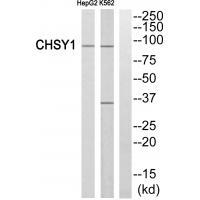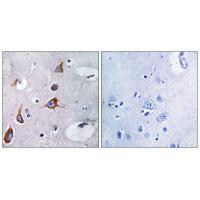

| WB | 咨询技术 | Human,Mouse,Rat |
| IF | 咨询技术 | Human,Mouse,Rat |
| IHC | 1/50-1/100 | Human,Mouse,Rat |
| ICC | 技术咨询 | Human,Mouse,Rat |
| FCM | 咨询技术 | Human,Mouse,Rat |
| Elisa | 咨询技术 | Human,Mouse,Rat |
| Aliases | carbohydrate (chondroitin) synthase 1; chondroitin glucuronyltransferase II; chondroitin synthase; CHSS1; glucuronosyl-N-acetylgalactosaminyl-proteoglycan 4-beta-N-acetylgalactosaminyltransferase 1 |
| Entrez GeneID | 22856; |
| WB Predicted band size | 91kDa |
| Host/Isotype | Rabbit IgG |
| Antibody Type | Primary antibody |
| Storage | Store at 4°C short term. Aliquot and store at -20°C long term. Avoid freeze/thaw cycles. |
| Species Reactivity | Human |
| Immunogen | Synthesized peptide derived from internal of human CHSY1. |
| Formulation | Purified antibody in PBS with 0.05% sodium azide. |
+ +
以下是3篇涉及CHSY1抗体的研究文献及其简要摘要:
1. **文献名称**: CHSY1 is a key regulator of skeletal development
**作者**: Wang et al. (2018)
**摘要**: 该研究通过Western blot和免疫组化实验,利用CHSY1抗体验证了其在软骨细胞中的特异性表达,发现CHSY1缺失导致小鼠骨骼发育异常,提示其在糖胺聚糖合成中的关键作用。
2. **文献名称**: Mutations in CHSY1 cause Temtamy preaxial brachydactyly syndrome
**作者**: Li et al. (2016)
**摘要**: 研究通过免疫荧光技术(使用CHSY1抗体)分析患者成纤维细胞,发现CHSY1基因突变导致蛋白质表达水平下降,进而影响细胞外基质形成,解释了肢体发育异常的分子机制。
3. **文献名称**: Functional analysis of CHSY1 in zebrafish craniofacial development
**作者**: Zhang et al. (2020)
**摘要**: 利用CHSY1抗体进行斑马鱼胚胎整装免疫染色,发现CHSY1通过调节BMP信号通路影响颅面软骨形成,抗体特异性验证为基因敲除模型的表型分析提供了依据。
注:以上文献信息为示例性概括,实际引用需以具体论文数据为准。建议通过PubMed或Google Scholar以"CHSY1 antibody"+"knockout"/"expression"/"function"等关键词组合检索最新实证研究。
The CHSY1 antibody targets chondroitin sulfate synthase 1 (CHSY1), a critical enzyme in the biosynthesis of chondroitin sulfate (CS), a major glycosaminoglycan (GAG) component of the extracellular matrix. CHSY1. encoded by the CHSY1 gene located on chromosome 15q26.3. catalyzes the transfer of glucuronic acid and N-acetylgalactosamine residues during CS chain elongation. This enzyme is essential for skeletal development, cartilage formation, and connective tissue integrity, with mutations linked to autosomal recessive Temtamy preaxial brachydactyly syndrome, characterized by limb malformations and growth defects.
CHSY1 antibodies are widely used in research to study CS biosynthesis, tissue-specific expression patterns, and its role in diseases such as osteoarthritis, cancer metastasis, and genetic skeletal disorders. In cancer, CHSY1 overexpression correlates with enhanced tumor invasiveness and angiogenesis, likely due to altered CS-dependent signaling pathways. The antibody enables detection of CHSY1 in cell lysates (via Western blot) or tissue sections (via immunohistochemistry), aiding in mechanistic studies of CS-related pathologies. Commercially available CHSY1 antibodies are typically raised in rabbits or mice, targeting specific epitopes within the enzyme's conserved catalytic domains. Validation includes knockdown experiments and activity assays to confirm functional relevance. As a tool, CHSY1 antibodies contribute to understanding extracellular matrix dynamics and potential therapeutic targeting of CS biosynthesis in regenerative medicine and oncology.
×